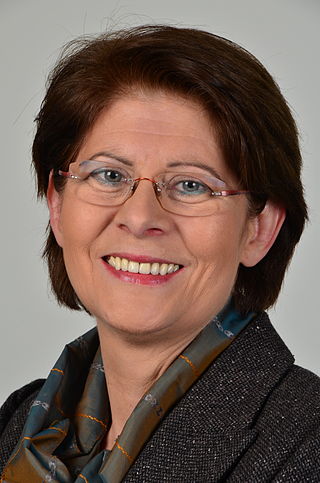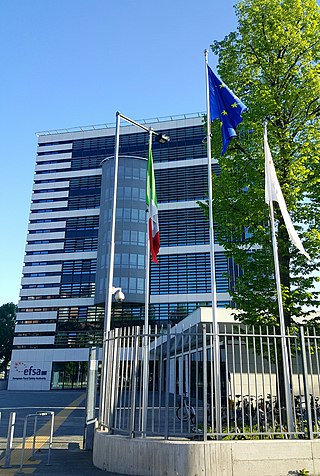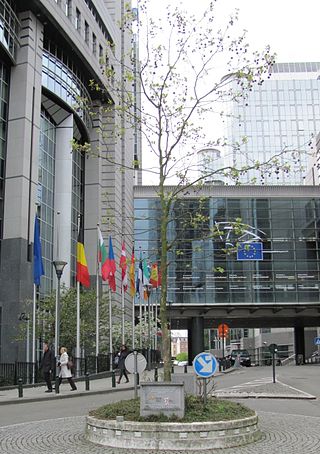Lobbying is a form of advocacy, which lawfully attempts to directly influence legislators or government officials, such as regulatory agencies or judiciary. Lobbying involves direct, face-to-face contact and is carried out by various entities, including individuals acting as voters, constituents, or private citizens; corporations pursuing their business interests; non-profits and NGOs through advocacy groups to achieve their missions; and legislators or government officials influencing each other in legislative affairs.

The European Ombudsman is an inter-institutional body of the European Union that holds the institutions, bodies and agencies of the EU to account, and promotes good administration. The Ombudsman helps people, businesses and organisations facing problems with the EU administration by investigating complaints, as well as by proactively looking into broader systemic issues. The current Ombudsman is Emily O'Reilly.
The Confederation of European Business, shortened as BusinessEurope, is a lobby group representing enterprises of all sizes in the European Union (EU) and seven non-EU European countries. It is made up of 40 national industry and employers' organizations. The current president of the confederation is Fredrik Persson, while the Director General is Markus J. Beyrer.

Renate Sommer is a German politician who served as a Member of the European Parliament (MEP) from 1999 until 2019. She is a member of the Christian Democratic Union, part of the European People's Party.

The European Food Safety Authority (EFSA) is the agency of the European Union (EU) that provides independent scientific advice and communicates on existing and emerging risks associated with the food chain. EFSA was established in February 2002, is based in Parma, Italy, and for 2021 it has a budget of €118.6 million, and a total staff of 542.
The American Chamber of Commerce to the European Union (AmCham EU) is a Belgium-based committee of companies that lobbies in the European Union for US companies and companies with US business ties. It is a member of Amchams in Europe (ACE), an umbrella organization of related committees.

The fossil fuels lobby includes paid representatives of corporations involved in the fossil fuel industry, as well as related industries like chemicals, plastics, aviation and other transportation. Because of their wealth and the importance of energy, transport and chemical industries to local, national and international economies, these lobbies have the capacity and money to attempt to have outsized influence on governmental policy. In particular, the lobbies have been known to obstruct policy related to environmental protection, environmental health and climate action.
In politics, a revolving door can refer to two distinct phenomena.

Fern is a Dutch foundation created in 1995. It is an international Non-Governmental Organization (NGO) set up to keep track of the European Union's (EU) involvement in forests and coordinate NGO activities at the European level. Fern works to protect forests and the rights of people who depend on them.

Alber & Geiger is a political lobbying agency and a European-based government relations law firm, lobbying EU institutions in Brussels. The firm has also a litigation practice at the European Court of Justice and has offices in Brussels and Berlin.
Europolitics was a daily European affairs publication, founded in 1972 in Brussels. It served as an information tool for key stakeholders and professional observers of the European Union. Contexte bought the defunct newspaper and its website in 2015 but said it had no plans to revive the publication.
Friends of the Earth Europe (FoEE) is the European branch of the world's largest grassroots environmental network, Friends of the Earth International (FOEI). It includes 33 national organizations and thousands of local groups.

The European Banking Authority (EBA) is a regulatory agency of the European Union headquartered in La Défense, Île-de-France. Its activities include conducting stress tests on European banks to increase transparency in the European financial system and identifying weaknesses in banks' capital structures.
ClientEarth is an environmental law charity, with offices in London, Brussels, Warsaw, Berlin, Beijing, Madrid and Los Angeles. It was founded in 2008 by James Thornton and the organisation's CEO is Laura Clarke. As lawyers and environmental experts, they use the law to hold governments and other companies to account over climate change, nature loss, and pollution.
The Alliance for Lobbying Transparency is a UK-based organisation formed in September 2007 and formally launched in January 2008 and concerned with the influence of lobbying on government decision-making.

The banking lobby refers to the representatives from various firms and organizations seeking favorable terms from governments for big banks and other financial service companies through lobbying and advocacy groups.
The European Privacy Association (EPA) is a Brussels-based lobbying group, founded in 2009. Its stated goal is "to enhance data protection and Internet freedom as fundamental principles of democracy." As of 2013, Karin Riis-Jørgensen is chairwoman of the EPA. Former EP member Pat Cox is among its founders.
A Lobby Registry, also named Lobbyist Registry, Register for Lobby Transparency or Registry of Lobbyists is a public database, in which information about lobbying actors and key data about their actions can be accessed.

Lobbying in the European Union, also referred to officially as European interest representation, is the activity of representatives of diverse interest groups or lobbies who attempt to influence the executive and legislative authorities of the European Union through public relations or public affairs work. The Treaty of Lisbon introduced a new dimension of lobbying at the European level that is different from most national lobbying. At the national level, lobbying is more a matter of personal and informal relations between the officials of national authorities, but lobbying at the European Union level is increasingly a part of the political decision-making process and thus part of the legislative process. 'European interest representation' is part of a new participatory democracy within the European Union. The first step towards specialised regulation of lobbying in the European Union was a Written Question tabled by Alman Metten, in 1989. In 1991, Marc Galle, Chairman of the Committee on the Rules of Procedure, the Verification of Credentials and Immunities, was appointed to submit proposals for a Code of conduct and a register of lobbyists. Today lobbying in the European Union is an integral and important part of decision-making in the EU. From year to year lobbying regulation in the EU is constantly improving and the number of lobbyists is increasing.

The Digital Services Act (DSA) is an EU regulation adopted in 2022 that addresses illegal content, transparent advertising and disinformation. It updates the Electronic Commerce Directive 2000 in EU law, and was proposed alongside the Digital Markets Act (DMA).










